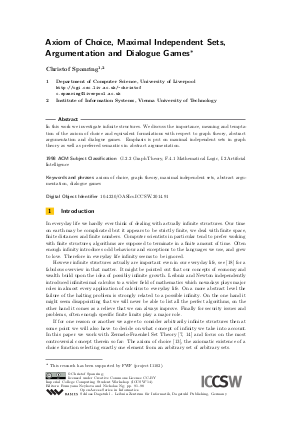Axiom of Choice, Maximal Independent Sets, Argumentation and Dialogue Games
Author Christof Spanring
-
Part of:
Volume:
2014 Imperial College Computing Student Workshop (ICCSW 2014)
Part of: Series: Open Access Series in Informatics (OASIcs) - License:
 Creative Commons Attribution 3.0 Unported license
Creative Commons Attribution 3.0 Unported license
- Publication Date: 2014-10-08
File

PDF
OASIcs.ICCSW.2014.91.pdf
- Filesize: 0.58 MB
- 8 pages
Document Identifiers
Subject Classification
Keywords
- axiom of choice
- graph theory
- maximal independent sets
- abstract argumentation
- dialogue games
Metrics
- Access Statistics
-
Total Accesses (updated on a weekly basis)
0PDF Downloads0Metadata Views
Abstract
In this work we investigate infinite structures. We discuss the importance, meaning and temptation of the axiom of choice and equivalent formulations with respect to graph theory, abstract argumentation and dialogue games. Emphasis is put on maximal independent sets in graph theory as well as preferred semantics in abstract argumentation.
Cite As Get BibTex
Christof Spanring. Axiom of Choice, Maximal Independent Sets, Argumentation and Dialogue Games. In 2014 Imperial College Computing Student Workshop. Open Access Series in Informatics (OASIcs), Volume 43, pp. 91-98, Schloss Dagstuhl – Leibniz-Zentrum für Informatik (2014)
https://doi.org/10.4230/OASIcs.ICCSW.2014.91
BibTex
@InProceedings{spanring:OASIcs.ICCSW.2014.91,
author = {Spanring, Christof},
title = {{Axiom of Choice, Maximal Independent Sets, Argumentation and Dialogue Games}},
booktitle = {2014 Imperial College Computing Student Workshop},
pages = {91--98},
series = {Open Access Series in Informatics (OASIcs)},
ISBN = {978-3-939897-76-7},
ISSN = {2190-6807},
year = {2014},
volume = {43},
editor = {Neykova, Rumyana and Ng, Nicholas},
publisher = {Schloss Dagstuhl -- Leibniz-Zentrum f{\"u}r Informatik},
address = {Dagstuhl, Germany},
URL = {https://drops.dagstuhl.de/entities/document/10.4230/OASIcs.ICCSW.2014.91},
URN = {urn:nbn:de:0030-drops-47776},
doi = {10.4230/OASIcs.ICCSW.2014.91},
annote = {Keywords: axiom of choice, graph theory, maximal independent sets, abstract argumentation, dialogue games}
}
Author Details
References
-
Pietro Baroni and Massimiliano Giacomin. Semantics of abstract argument systems. In Iyad Rahwan and Guillermo Ricardo Simari, editors, Argumentation in Artificial Intelligence, chapter 2, pages 25-44. Springer, 2009.

-
Trevor J. M. Bench-Capon, Sylvie Doutre, and Paul E. Dunne. Asking the right question: forcing commitment in examination dialogues. In Philippe Besnard, Sylvie Doutre, and Anthony Hunter, editors, Proceedings of the 2nd Conference on Computational Models of Argument (COMMA 2008), volume 172, pages 49-60. IOS Press, 2008.

-
Béla Bollobás. Modern graph theory, volume 184. Springer, 1998.

-
Martin Caminada and Dov M. Gabbay. A logical account of formal argumentation. Studia Logica, 93(2):109-145, 2009.

-
Martin Caminada and Bart Verheij. On the existence of semi-stable extensions. In Proceedings of the 22nd Benelux Conference on Artificial Intelligence, 2010.

-
Paul J Cohen. The independence of the continuum hypothesis. Proceedings of the National Academy of Sciences of the United States of America, 50(6):1143, 1963.

-
Keith Devlin. The Joy of Sets: Fundamentals of Contemporary Set Theory. Undergraduate Texts in Mathematics. Springer, Springer-Verlag 175 Fifth Avenue, New York, New York 10010, U.S.A., 2nd edition, 1994.

-
Phan Minh Dung. On the acceptability of arguments and its fundamental role in nonmonotonic reasoning, logic programming and n-person games. Artif. Intell., 77(2):321-358, 1995.

-
Harvey M. Friedman. Invariant maximal cliques and incompleteness, 2011.

-
Kurt Gödel. Über formal unentscheidbare Sätze der Principia Mathematica und verwandter Systeme I. Monatsh. Math. Phys., 38(1):173-198, 1931.

-
Kurt Gödel and George William Brown. The consistency of the axiom of choice and of the generalized continuum-hypothesis with the axioms of set theory. Princeton University Press, 1940.

-
Charles Leonard Hamblin. Fallacies. Methuen London, 1970.

-
Thomas Jech. About the axiom of choice. Handbook of mathematical logic, 90:345-370, 1977.

-
Thomas Jech. Set Theory. Springer, 3rd edition, 2006.

-
Kenneth Kunen. Set Theory An Introduction To Independence Proofs (Studies in Logic and the Foundations of Mathematics). North Holland, 1983.

-
Peter McBurney and Simon Parsons. Dialogue games for agent argumentation. In Argumentation in artificial intelligence, pages 261-280. Springer, 2009.

-
Jan Mycielski. On the axiom of determinacy. Fund. Math, 53:205-224II, 1964.

-
Rudy Rucker. Infinity and the Mind: The Science and Philosophy of the Infinite (Princeton Science Library). Princeton University Press, 2004.

-
Lajos Soukup. Infinite combinatorics: from finite to infinite. In Horizons of combinatorics, pages 189-213. Springer, 2008.

-
Stephen Toulmin. The Uses of Argument. Cambridge University Press, 2003.

-
Gerard AW Vreeswik and Henry Prakken. Credulous and sceptical argument games for preferred semantics. In Logics in Artificial Intelligence, pages 239-253. Springer, 2000.

-
Douglas N Walton. Logical Dialogue-Games. University Press of America, Lanham, Maryland, 1984.

-
Douglas Brent West et al. Introduction to graph theory, volume 2. Prentice hall Upper Saddle River, 2001.

